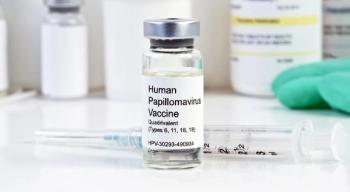
ACA Medicaid expansion benefited women younger than 65 who were diagnosed with a gynecologic cancer between 2011 and 2014, a SEER database analysis found.

Your AI-Trained Oncology Knowledge Connection!


ACA Medicaid expansion benefited women younger than 65 who were diagnosed with a gynecologic cancer between 2011 and 2014, a SEER database analysis found.

An “ultra-restrictive” policy to reduce opioid prescribing to women who underwent major gynecologic cancer surgeries dramatically reduced opioid use.

A registry study suggests that there may be a familial association between ovarian and testicular cancers.

A large study found no association between the use of metformin or statins and the incidence of ovarian cancer in women with type 2 diabetes.

Lifastuzumab vedotin offered a modest improvement in progression-free survival over standard care in patients with platinum-resistant ovarian cancer.

A meta-analysis incorporating tens of thousands of individuals found no association between the use of antidepressants and the risk of epithelial ovarian cancer.

The novel agent prexasertib showed promising activity and was reasonably well tolerated in a phase II study of high-grade, heavily pretreated, BRCA wild-type serous ovarian carcinoma.

Use of oral contraceptives may be beneficial for chemoprevention for a range of women with different baseline cancer risks, according to the results of a new study.

Treatment with hyperthermic intraperitoneal chemotherapy along with cytoreductive surgery resulted in better survival outcomes than surgery alone in patients with stage III epithelial ovarian cancer, according to a new study.

The FDA has granted priority review status to rucaparib as maintenance therapy for women with recurrent ovarian cancer, according to the drug’s developer.

The addition of pazopanib to paclitaxel failed to improve outcomes over paclitaxel alone in women with persistent or recurrent epithelial ovarian cancer.

In this slide show we highlight some of the top news on gynecologic cancers in 2017, including studies on surgery for cervical and ovarian cancer, the FDA approval of niraparib, and more.

The majority of surveyed ovarian cancer patients required a 5-year survival benefit of 6% or less to justify an additional 50 miles of travel for cancer care.

The immune checkpoint inhibitor pembrolizumab demonstrated antitumor activity in a small trial of patients with advanced cervical cancer. The agent had a similar toxicity profile to that seen in other malignancies.

Comprehensive geriatric assessments will play an increasingly important role in identifying patient frailty and personalizing geriatric oncology treatment, according to recently published reviews.

A large cohort study found no concerning safety issues associated with the use of human papillomavirus (HPV) vaccine in adult women. There was an increased rate of celiac disease, but this may be related to general underdiagnosis of the condition and its unmasking at vaccination visits.

Extending the platinum-free interval following disease progression in ovarian cancer with a non-platinum agent does not improve outcomes over the standard practice of using a platinum-based chemotherapy, according to a prospective trial.

The USPSTF issued a new draft recommendation for cervical cancer screening, recommending screening with cervical cytology every 3 years for women aged 21 to 29, and offering a choice between cytology every 3 years and high-risk human papillomavirus testing every 5 years for those aged 30 to 65 years.

A large database study found that most patients with stage I endometrioid epithelial ovarian cancer or ovarian clear cell cancer do not have better survival outcomes when treated with adjuvant chemotherapy.

This video reviews results of a phase III trial that compared pelvic radiation therapy vs vaginal cuff brachytherapy plus chemotherapy in patients with early-stage, high-risk endometrial cancer.

Weekly dose-dense chemotherapy can be delivered successfully and with lower toxicity than standard 3-weekly regimens, but it does not improve progression-free survival among patients with epithelial ovarian cancer, according to a large new study presented at the ESMO.

Two studies on Lynch syndrome highlight cancer screening and surveillance opportunities.

Women with increased levels of cadmium, which mimics estrogen in the body, had a higher risk of endometrial cancer, according to a recently published observational study.

Olaparib tablet maintenance therapy provided a significant improvement in progression-free survival over placebo in patients with relapsed, platinum-sensitive ovarian cancer with a BRCA1/2 mutation.

Women who undergo HPV testing following a test showing abnormal cytology have earlier detection of high-grade cervical intraepithelial neoplasia, compared to those who do not undergo HPV testing.